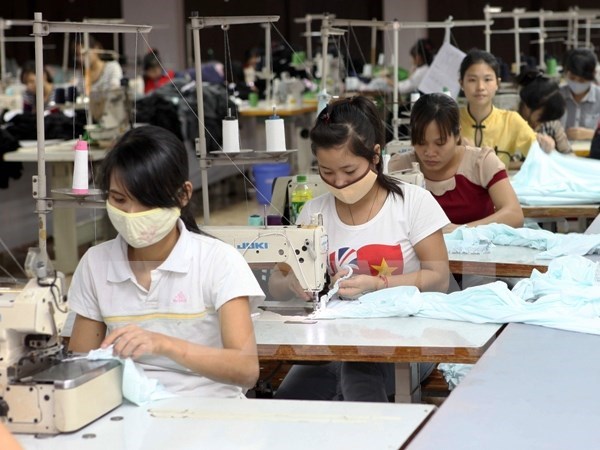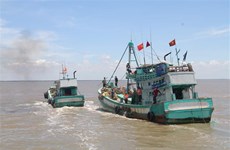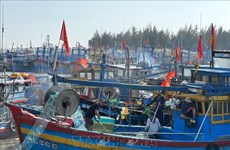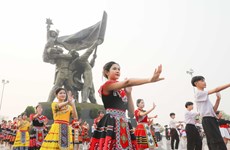Minimum wage should be hourly: official
Bui Sy Loi, Deputy Chairman of the Social Affairs Committee of the National Assembly, talks with Thoi Bao Kinh Te Vietnam (Vietnam Economic Times) about calculating minimum wages for employees.
 Workers at a garment factory (Photo: VNA)
Workers at a garment factory (Photo: VNA)Hanoi (VNA) – Bui Sy Loi, Deputy Chairman of the Social Affairs Committee of the National Assembly, talks with Thoi Bao Kinh Te Vietnam (Vietnam Economic Times) about calculating minimum wages for employees.
* It is difficult to set up a minimum wage that is satisfying to both employers and employees. Employees’ representatives (trade unions) say labour productivity will increase if the minimum wage can provide a minimum living standard to employees. Yet employers argue that labour productivity declines as minimum wages increase. What is your opinion on the issue?
The minimum wage is an effective tool to protect employees, especially vulnerable labourers. The mechanism for minimum wages is based on negotiations between three parties: employees’ representatives (trade unions), employers and the State, with an aim of ensuring mutual benefit. The mechanism was set up by the National Salary Council as per the Labour Code issued in 2012.
However, the minimum wage mechanism was not the only tool to define the salary in the labour market. It is because the real salary of employees varies depending on the skills and capabilities of individual workers.
The real salary has increased by 8 percent annually, faster than the growth of the country’s GDP.
For the last two years, the minimum wage has been increasing rapidly. However, the wage has not met the minimum demand to cover employees’ daily lives.
But we should look at the relationship between an increase in minimum wages and economic growth.
The minimum wage must harmonise several factors, including workers’ daily needs, productivity and business competitiveness.
Therefore, it is necessary to negotiate between employees’ representatives – trade unions - employers and State agencies to define a proper rate increase. The aim is to ensure that businesses have long-term stability and can develop to create more jobs, as well as meet employees’ requirements.
* Some employers say that the minimum demands of daily life are varied, so the minimum wage cannot be uniform. What do you think about this viewpoint?
At present, we have a misunderstanding of minimum wages and minimum living standards.
The minimum wage has to meet the minimum living standard of employees and their families. If the minimum wage is too low, employees do not have enough money to invest or pay for their children’s education.
So, the minimum wage must be adjusted based on socio-economic development. And the labour force should be compensated in accordance with market mechanisms.
Currently, the minimum wage is based on the prices of food only. This does not reflect the real nature of minimum wages.
* How will minimum wages be adjusted to ensure all parties benefit next year?
Vietnam is in the process of carrying out business equitisation. Shifting from State-owned enterprises to stock or private enterprises requires fair salaries among economic sectors.
The Law on Enterprise mandates that all economic sectors have a level playing field and that employees’ minimum salaries must be calculated on the same scale.
As for salary regulation, social and health insurance purchases and other fees are based on salary. At present, all the fees that are paid by employees and employers account for 35.5 percent of the salary. This creates difficulties for both employees and employers.
Therefore, authorised agencies must re-calculate the compulsory payments so as to create favourable conditions for business growth while also ensuring benefits for employees, especially when they retire.
We are implementing a salary mechanism for the annual salary scale issued by the Government. Meanwhile, many other countries define minimum wages hourly, which helps to increase labour productivity and reflects the real nature of salaries in the market economy.
So I think this salary adjustment should be done that way.-VNA













